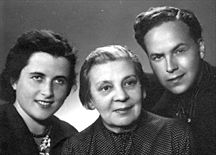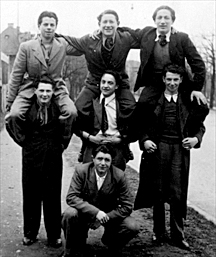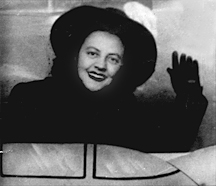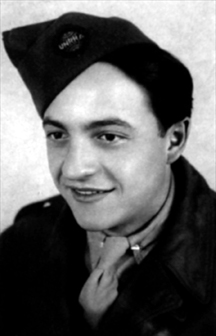
Introduction
Light One Candle
Death March
Current Writing
Poetry
Photo Gallery
Commentary
Contact Me

My beloved aunt Anushka (middle) with my cousins Irena Weissaite and Dr. Alexander Stromas.
My aunt Anushka played an important part in my prewar life, and also in the Kovne ghetto. It was at her shop were I first met Chiune Sugihara.
My cousin Irena Weisseita lives in Vilnius and lectures as a professor at Vilnius University. She was recently awarded the honorary title of Doctor. She is very active in cultural activities and was until recently the Chairman of the Sores Foundation.
My cousin Dr. Alexander Shtromas died recently in Chicago where he lectured on peace studies at the university of Chicago. During the war we were all incarcerated in the ghetto of Kovne. Towards the end of the ghetto, when the Russians reoccupied Lithuania , my cousins Irena and Alexander were hidden by Lithuanian Christians until the Soviets arrived in Kovne. My aunt Anushka was evacuated with us to Stutthof. She survived the war and returned to Kovne where she was reunited with my cousins. She died in Kovne in 1966.

October 1946. The photo was taken in Munich, at the famous October Fest. There are seven of us, all boys from Lithuania who survived the Holocaust together and were liberated by the US forces on May 2, 1945. We remained together in Munich until my departure for Israel to join the Israeli Defense Forces in 1948.
From left to right, the upper row:
Locke Karklin, from Shiauliai Lithuania. He presently lives in Trenton New Jersey. David Granat, one of my best friends to this day, lives in Baltimore, Maryland, and Florida. David Levine (Pozaicer) also a dear friend, lives in Cincinnati, Ohio.
The lower row from left to right:
Leibke Mereine, who lives in Ramat Gan, Israel. Myself, Solly Ganor ( Zalke Genkind), I live in Herzelia, Israel and La Jolla California. Michael Kurzer, who died in Dayton Ohio, in 1977. We lost touch with the seventh boy, whose first name is Ruben, in 1946.
In July 1944, as the Soviet Army recaptured Lithuania, we were all evacuated by the German SS forces from Kovne ghetto to concentration camps in Germany. David Granat and myself were brought to Stutthof by Danzig, where we remained for six weeks, then sent to a satellite camp of the notorious Dachau concentration camp. The camp known as Lager X, was near a small picturesque lake resort, named Utting am Amersee.
The other boys were sent to the satellite camp Lager 1, near the medieval town of Landsberg am Lech. It was there, while spending time in the local prison for subversive activities, that Adolf Hitler wrote his book 'Mein Kampf' that sealed the fate of European Jewry, including the Jews of Lithuania. In this hateful book he laid down the foundation for our destruction.
The reason the seven of us survived was because we were more muscular than the other boys and therefore considered still fit for slave labor. We were lined up, about sixty of us and told to take off our shirts. The capo in charge looked us over and decided our fate. We knew the score and all of us began flexing our muscles, but the younger ones and the weak were sent to Auschwitz to the gas chambers, while we, the remaining 'strong' ones, were sent to Dachau to be worked to death. "Light One Candle." 267

My sister Fanny was like a mother to me as she was fourteen years older than I. During the war, when we were in ghetto Kovne, she frequently risked her life to bring extra food from the outside to the ghetto.
On July 1944, when we were brought to the concentration camp Stutthof, she and my mother remained there, while my father and I were sent Dachau. My mother died in her arms of typhoid fever on December 25, 1944 on Christmas day.
By the end of the war, the Nazis decided to drown all the Jewish women remaining in Stutthof in the Baltic Sea. They loaded them on barges and were towed by tug boats to deep waters where they intended to scuttle the barges and drown all the inmates. Their plans were thwarted by the British air force who mistakenly bombed them, assuming that the barges were supplies vessels for the German army.
My sister wounded in the left knee by bomb, found herself with many more women swimming towards the shore miles away. In their weakened condition there was no chance for any of them to save themselves. A most unlikely rescuer arrived on the scene, a German Navy patrol boat. They pulled as many women out as the small boat could carry, the rest were abandoned and drowned. Among the rescued was my sister.
The patrol boat then proceeded to the German harbor of Kiel. Fortunately, the harbor had been captured by British forces, and the women were unloaded and sent to hospitals.
My sister's wound became infected and for many weeks she fought for her life. When she finally came out of her coma, she was sent to Sweden for recuperation. A year later she immigrated to the United States where she married Sam Skutelsky, a Latvian survivor and a wonderful man. They have one son, Robert Skutelsky, who lives with his wife Meg in Boulder Colorado. Both my sister Fanny, and her husband Sam, died at a young age in New York City.

David Granat shortly after his liberation, carrying a shovel on his shoulders. This photo was taken in Munich.
We became inseparable friends during our three years in Munich together after the war. Then in 1948 I left for Israel and he left for the US where he became a successful business man. I eventually became a mariner, and from the early fifties we saw each other very often, as my ship made port in Baltimore every few months.
We are in constant touch to this day and he has a special part in my book, "Light One Candle."

This photo was taken in 1946 when I served as an interpreter with the American forces in Germany.
I worked with a special unit of the CIC, (Counter Intelligence Corp), known as Screening Unit 11. Our job was to interrogate displaced persons in DP camps.
Nazi collaborators and SS men from Lithuania, Ukrain and Russia were hiding in those camps pretending to be workers brought to Germany as forced labor.
Many of these SS men were among the murder squads that killed Jews in Europe. As I knew Lithuanian, Russian and German my job was to interrogate and find these Nazi collaborators.
It was a hard but satisfying job as I managed to find quite a few Nazis and expose them to the American Forces Justice department.
